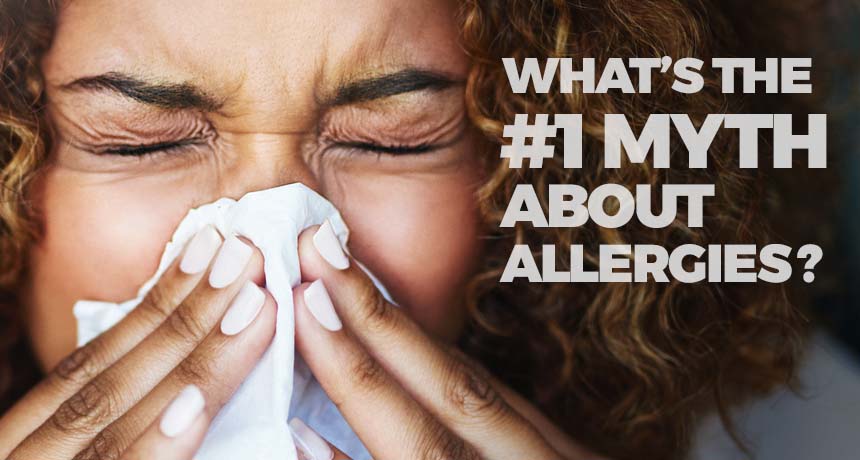More than 50 million Americans suffer from allergies each year. But as common as allergies are, they are frequently misunderstood. What are some of the most common myths and misconceptions about allergies? According to Dr. Z, the #1 misconception people have is that there’s nothing they can do about their allergies, that they just have to suffer. It’s important to know the facts from the fiction so that you can effectively get relief.

Myth #1 – You just have to suffer.
According to Dr. Z, most allergy sufferers think that they just have to suffer with their allergies, year in and year out. “The truth is, is that there are ways to turn it off that are really easy,” he says. “There’s desensitization that people don’t realize can really make a difference in feeling better and have long-lasting benefits.” As a functional allergist, Dr. Z looks to treat the root cause of the allergy to defeat the symptoms. Because an allergy is an expression of a breakdown in the body’s immune tolerance, the first step is to reduce the stress and inflammation that’s causing the allergic response. The healing process starts with eating the right foods to create a healthy microbiome in your gut.

Allergy Immunotherapy
Learn more about how Dr. Z turned off his allergies—and how you can, too.
Myth #2 – You can’t tell the difference between colds and allergies.
Colds and allergies may share some similar symptoms such as runny nose and congestion, but they have different causes. The common cold is caused by viruses, whereas seasonal allergies occur when the immune system overreacts to an allergen. Colds usually last for 7-10 days while allergy symptoms typically last for many weeks or even months, depending on the prevalence of exposure to the allergen. Other cold symptoms, such as body aches and fever, are not associated with allergies, and the itchy, watery eyes common to an allergic reaction rarely occur with a cold.
Myth #3 – It’s your pet’s fur that triggers allergies.
People often think that it’s the fur or hair from their pet that causes an allergic reaction. But the actual culprit is dander, which can be on the animal’s skin and in their saliva and urine. It’s true that people may be less sensitive to certain animal breeds, but there is no truly hypoallergenic pet. If your pet allergy is not severe, here are some things you can do to reduce your risk of having an allergic reaction:
- Limit contact with your pet
- Wash your hands after touching your pet
- Use an air cleaner with a HEPA filter
- Vacuum floors and furniture regularly
- Bathe your pet at least once a week to help reduce dander
Myth #4 – Food allergies always develop in childhood; and each allergic reaction to food becomes increasingly worse.
The truth is that you can develop a food allergy at any age, even if it’s a food you’ve safely eaten before. According to Food Allergy Research & Education (FARE), children with food allergies can outgrow the allergy over time, particularly with allergies to milk, egg, soy, and wheat. Allergies that are harder to outgrow include peanut, tree nuts, fish, and shellfish. The severity of a reaction can be mild or severe based on a number of factors, including the amount of food ingested.
Myth #5 – Black bathroom tile mold is always toxic.
While some people are allergic to mold that releases airborne spores, the black mold that often appears on bathroom tub and shower grout is typically so small and so embedded in porous tile grout that it doesn’t travel in the air and therefore doesn’t enter the lungs or respiratory tract. If you have larger, more significant areas of black mold in your home, call a mold remediation specialist to assess the issue prior to removal.
We’re here to treat the cause, defeat the symptoms.
AAPRI is the only practice in Rhode Island offering allergy immunotherapy, also known as allergy shots or allergy drops. To learn more about this effective treatment, schedule a consultation today. We’re ready to help you start feeling better!

